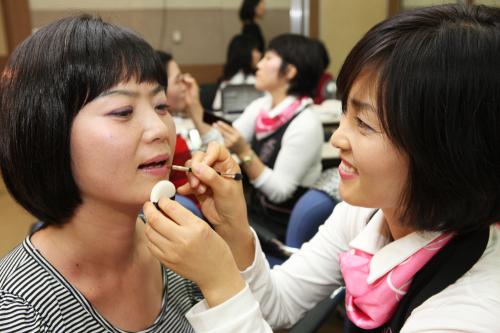Maeil, CJ, Amore Pacific make special products for minorities as part of CSR
Chung Hye-jin discovered her baby daughter had phenylketonuria, or PKU, 12 years ago. The rare disease affects only one in 60,000 babies here.
In order to avoid damage to the brain, people with PKU should adhere to a strict low-protein diet, particularly in childhood.
Until 1999, Korean parents had to depend on imported specialty baby formula, while some of them went abroad to get the products.
Tariffs of 50,000-60,000 won ($43-52) per can also made the baby food almost five times the price of general baby formulas. There were supply problems too.
“Mothers became terrified when stocks ran out. Money was not the main issue,” the 41-year-old mother told The Korea Herald.
Chung said her daughter was lucky to be one of the first children to benefit from Korean-made specialty baby formulas.
Maeil Dairies Co. has produced specialty formulas for babies with rare genetic disorders such as PKU, starting with the five cans for only one baby in 1998.
And the company has never made a profit from the business so far, and has lost hundreds of millions won in R&D activities and production, said Park Jae-rang, a PR manager of Maeil.
Of the 20,000 cans of specialty formula produced a year, some 300 children consume 2,500 cans and the rest is disposed of.
Because the process requires a very sensitive treatment of ingredients, the production lines should be reorganized every time, with cleaning the machines alone taking 4-5 hours.
 |
A cancer patient receives make-up from an employee of Amore Pacific at a hospital in Seoul. (Amore Pacific) |
The company currently produces 10 types of specialty formulas, including the latest two, launched in August after years of research work. Only 17 children consume the new products.
“It’s true that the business doesn’t make money. But all employees understand the company’s willingness to proceed with it and feel a sense of pride,” said Park.
The company is also seeking ways to export the leftover products to other countries after providing some to Chinese twins in 2005.
At this time when corporate social responsibility has become a niche word in businesses, experts say that kind of “talent donation” could be an advanced way of social contribution for local companies.
“They make a difference by doing what they can do best,” said Roh Han-kyun, an assistant professor of business administration at Kookmin University.
“It’s meaningful that they have identified the demands of minority groups and actually improved their lives.”
Companies that make products or services for social minorities are still rarely found in Korea. But a growing number of companies are paying attention to such activities and taking actions.
Maeil’s “nonprofit” business inspired a leading food maker CJ CheilJedang to produce a low-protein cooked rice product in 2009.
“It was another revolution,” Chung, the mother, recalled when CJ’s new “Hetbahn” product was released.
“What’s most frustrating is my daughter cannot eat enough. She always feels hungry. But the rice product has dramatically relieved her hunger,” she said.
The 1,800 won rice item has replaced its Japanese counterpart priced at 4,000 won here, with the taste largely improved, both Chung and the company said.
CJ is also willing to suspend all the production of normal Hetbahn, the company’s best-selling item, to produce the low-protein product.
“Because we know well about the hard work of the companies, I always teach my daughter not to leave any leftovers,” Chung said.
Amore Pacific, the nation’s largest beauty company, has also developed a special “Make up your life” kit that is specially developed for female cancer patients who suffer from hair loss and changes in the skin.
The kit consists of a four-phase skincare line and seven make-up products such as concealer. The make-up tools that come with the kits have been designed to avoid irritation to the skin as well.
The company holds make-up class programs regularly at hospitals nationwide and about 5,500 women have participated in the program over the past four years.
“Many female cancer patients suffer from depression due to the drastic changes in their looks. Whenever we hold the make-up event, they show an enthusiastic response,” said Lee Yoon-ah, a spokesperson for Amore Pacific.
Roh cautioned that companies should not approach this new concept of social contribution as part of a short-term marketing strategy.
“What’s important is that a company and its employees would have more commitment. Then their activities would be warmly welcome by consumers. That kind of better communication with society would ultimately become company strengths and improve competitiveness,” he said.
Park Jung-sik, 33, who helped develop the specialty baby formula at Maeil’s R&D center since 2007, said he feels sorry that the products do not taste better.
“It must taste terrible for young children. There are a variety of foods for people with rare diseases in other countries. I hope other food companies and the government to join hands to help them,” he added.
By Lee Ji-yoon (
jylee@heraldcorp.com)








